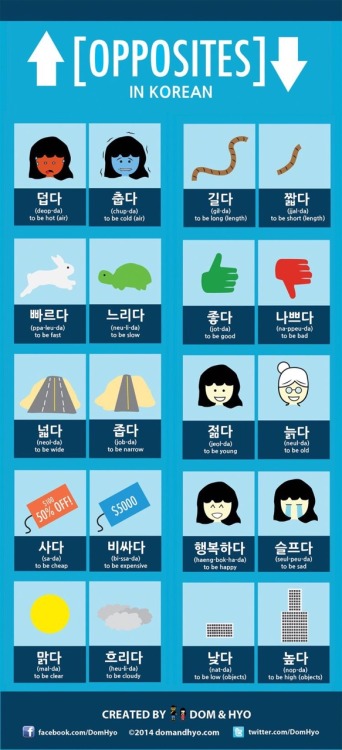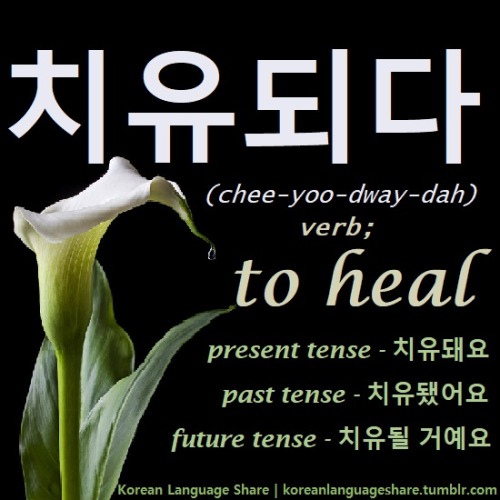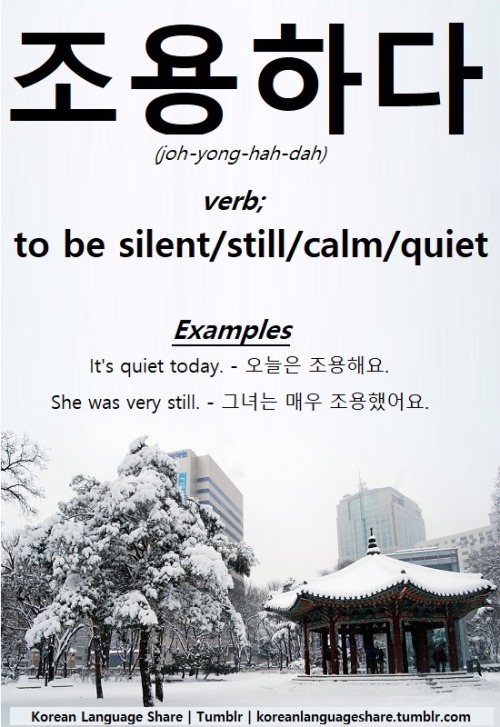#hangul
안녕하세요 여러분! Hey everyone! I got a request for a vocab list about K-pop fandom-related words, so here it is! This is a combination of words you might use as a fan and some words related to being an idol. I hope it’s helpful :) Let’s start!
Nouns
- 가사 = lyrics
- 가수 = singer
- 그룹 = group
- (메인, 리드) 댄서 = (main, lead) dancer
- 리더 = leader
- (메인, 리드) 래퍼 = rapper
- 막내 = the youngest member of a group
- (메인, 리드) 보컬 = vocal
- 노래 = song
- 뮤직비디오 = music video
- 뮤비 is short for this.
- 멤버 = member
- 비주얼 = visual
- 밴드 = band
- 안무 = choreography
- 안무 연습 = dance practice
- 아이돌 = idol
- 연습생 = trainee
- 응원봉 = lightstick
- 인터뷰 = interview
- 앨범 = album
- (제일) 좋아하는 멤버 = bias
- 제일 좋아하는 멤버 literally means “favorite member” or “member you like the most.” I often just see 좋아하는 멤버 to mean the same thing, even though it literally means “member that you like.”
- 컴백 = comeback
- 콘서트 = concert
- 콘서트티켓 = concert ticket
- 케이팝 = K-pop
- 포토카드 / 포카 = photocard
- 팬 = fan
- 팬사인회 = fan signing event
- 팬클럽 = fan club
Verbs
- 덕질하다 = to be a die-hard fan of; to be really into
- 노래하다 = to sing
- 노래를 부르다 is another word for “to sing”
- 데뷔하다 = to debut
- 녹음하다 = to record
- 연습하다 = to practice
- 응원하다 = to cheer on; to support
- 촬영하다 = to shoot; to film
- 춤을추다 = to dance
- 컴백하다 = to have a comeback
That’s about it for this list! 제일 좋아하는 밴드가 뭐예요? 코멘트 하세요! What is your favorite band? Leave a comment! See you in the next lesson! 다음에 또 봐요!
- My masterlist
- Joinmy Discord chat here to practice Korean with others!
- Follow me onInstagram herefor more Korean content!
- GetDrops Premium usingmy affiliate link to expand your Korean vocab!
- Check out myKo-Fi to support this blog and my studies! Thank you for your generosity!
안녕하세요! Hello again everyone! I have yet another breakdown that was requested! If there’s a song you want to see broken down, let me know and I’ll try to fulfill your request!
You can listen to this song here! I used colorcodedlyrics.comandNaver Dictionary to help me translate these lyrics! I also linked my full-length lessons about the grammar structures featured in this song if you want to learn more about them. Let’s start!

거울 속에 마주친 얼굴이 어색해서 / 습관처럼 조용히 눈을 감아 / 밤이 되면 서둘러 내일로 가고 싶어
The face in the mirror is awkward / So like a habit I quietly close my eyes / When the night comes I want to hurry up and go to tomorrow
- 거울 = Mirror
- 속에 = Inside
- 마주치다 = to meet (usually refers to eyes meeting)
- 얼굴 = face
- -ㄴ/은allows you to describe nouns with that verb in the past tense. So 마주친 얼굴 literally means “the face that I met.”
- -이 is a subject particle – more about particles here!
- 어색하다 = awkward
- -아/어서 means “so” or “because.” 어색해서 means “because it’s awkward” or “it’s awkward, so…”
- 습관 = habit
- [noun] + 처럼 = like [noun]
- 조용하다 = quiet; 조용히 = quietly
- 눈 = eye(s)
- 감다 = to close (when talking about eyes)
- 밤 = night
- 되다 = to become (밤이 되다 literally means “to become night”)
- -(으)면 = if/when
- 서두르다 = to rush; to hurry
- 내일 = tomorrow
- -(으)로in this context means “to” or “towards.”
- 가다 = to go
- [verb stem] + 고 싶다 = I want to [verb]
설렘으로 차오르던 나의 숨소리와 / 머리 위로 선선히 부는 바람 / 파도가 되어 어디로든 / 달려가고 싶어 / 작은 두려움 아래 천천히 두 눈을 뜨면
My breath that rose up with excitement / And the wind that blows coolly above my head / I want to become a wave / And run anywhere / When I slowly open my eyes under the small fears
- 설렘 = excitement; thrill
- Here, -(으)로 means “with”
- 차오르다 = to rise up
- 나의 = my (informal) -> 나 means “I,” while -의 is a possessive marker.
- 숨소리 = breath -> refers to the sound of breath
- [verb stem] + 던is another way to describe a noun with a verb. It is used for actions that you used to do repeatedly in the past or that you did but did not complete.
- -와 = and
- 머리 = head
- 위로 = above; top
- 선선히 = coolly
- 불다 = blow
- 불다’s stem ends in ㄹ, which gets dropped when you want it to describe a noun.
- 바람 = wind
- 파도 = wave
- 어디로든 = anywhere
- 달려가다 = to run
- 작다 = small
- 두려움 = fear -> noun form of the verb 두렵다, meaning “afraid”
- 아래 = below; bottom
- 천천히 = slowly
- 두 = two (this is the word for “two” that you put before a noun)
- 뜨다 = to open (eyes)
휩쓸려 길을 잃어도 자유로와 / 더이상 날 가두는 / 어둠에 눈 감지 않아 / 두 번 다시 날 모른 척 하지 않아
I’m free even when I’m swept away and get lost / I won’t close my eyes / in the darkness that traps me anymore / I won’t pretend to not know who I am again
- 휩쓸리다 = to be swept away
- 길을 잃다 = to get lost
- -아/어도 = even though/even if
- 자유롭다 = to be free
- 더이상 = anymore
- 날 = me (informal)
- 가두다 = to trap; to confine; to lock up
- 어둠 = darkness
- -지 않다 = to not [verb/adjective]
- 두 번 = twice
- 다시 = again
- 모르다 = to not know
- -척 하다 = to pretend to [verb/adjective]
That’s about it for this breakdown! Hope it was helpful and fun to read! See you in the next lesson! 다음에 또 봐요!
- My masterlist
- Joinmy Discord chat here to practice Korean with others!
- Follow me onInstagram herefor more Korean content!
- GetDrops Premium usingmy affiliate link to expand your Korean vocab!
- Check out myKo-Fi to support this blog and my studies! Thank you for your generosity!
안녕하세요 여러분! Hey everyone! I got yet another request for a breakdown! If you have a song you’d like to see broken down, let me know! I linked my full-length lessons about the featured grammar points throughout as well in case you want to learn more about them!
I translated all these lyrics myself, but I did refer to this lyric videoandNaver Dictionary to help me out :) Let’s start!
나를 스쳐가는 그대 / 내 말을 들어줘 / 걸음을 멈추고 / 내 노랠 들어줘
You brush against me / Listen to what I have to say / Stop in your tracks / And listen to my song
- 나를 = me
- 나 is the informal way to say “I,” while -를 is an object particle. More about particles here!
- 스쳐가다 = to brush against; to pass by
- 그대 = you -> This is a poetic/romantic way to say “you” and isn’t really used in everyday spoken Korean.
- [verb stem] + 는 allows you to describe nouns with that verb. 나를 스쳐가는 그대 literally means “you who brushes against me.”
- 내 = my (informal)
- 말 = words
- 듣다 = to listen; to hear
- 듣다’s stem ends in ㄷ, so it becomes 들어줘 when conjugated.
- [verb stem] + 아/어주다 means that a verb is done forsomebody and can be used when pleading that someone do something for you. In this case, he’s commanding that you listen to him.
- Literally, this line means “listen to my words.”
- 걸음 = step(s) -> from the verb 걷다, meaning “to walk”
- 멈추다 = to stop
- -고 is a connector that means “and.” This line means “stop in your tracks and…”
- 노래 = song
축 처진 고개들과 / 비틀거리는 그림자 / 그렇게 나는 불청객이 돼 / 아무도 모르는 yeah / 노래를 부르며 yeah
Among the drooping heads / And staggering shadows / I become an uninvited guest / While I sing a song / That nobody knows
- 축 처지다 = droop; hang; sag
- 고개 = head
- Attach -들 to nouns to make them plural
- [verb stem] + ㄴ/은 allows you to describe a noun with that verb in the past tense. So 축 처진 고개들 literally means “heads that drooped.”
- 과/와is attached to nouns to mean “and” or “with.” 과 is attached to nouns ending in a consonant, while 와 is attached to those ending in a vowel.
- 비틀거리다 = stagger; stumble; falter; totter
- 그림자 = shadow(s) (it can still be implied that a noun is plural without the -들 depending on the context!
- 그렇게 = like that
- 불챙객 = uninvited guest
- 되다 = to become
- These lines were a little tricky to translate, but I think it essentially means “the drooping heads and staggering shadows, like that, I become an uninvited guest” as if he is an uninvited guest because the drooping heads and staggering shadows make him one.
- 아무도 = nobody
- 모르다 = to not know
- 아무도 모르다 sounds like a double negative – nobody doesn’t know. But in Korean, this is the correct way to say “nobody knows”! When using indefinite pronouns like 아무것도, 아무데도, (nothing, nowhere), etc., you need to use a negative verb like so.
- 부르다 -> when paired with 노래, means “to sing.”
- [verb stem] + (으)며means “while [verb]” and is used when two actions are happening at the same time.
아무도 모르는 / 노래를 부를래 / 지나가는 너의 / 마음을 붙잡을 수 있길 바라며
I’ll sing a song / That nobody knows / Hoping that I can grasp your heart / As it passes
- [verb stem] + ㄹ/을래(요) means “I will [verb]” or “I want to [verb].” It expresses a strong intention to do something.
- 지나가다 = pass; go by
- 너의 = your(informal)
- 너 means “you” (informal), and -의 is a possessive marker.
- 마음 = hear
- 붙잡다 = grasp; grab; hold
- [verb stem] + ㄹ/을 수 있다 = can [verb]
- [verb stem] + 기를 바라다 = to hope that [verb]
- Those last two lines literally mean “while hoping I can grasp your passing heart.”
That’s about it for this breakdown! Hope it was helpful :) See you in the next lesson! 화이팅!
- My masterlist
- Joinmy Discord chat here to practice Korean with others!
- Follow me onInstagram herefor more Korean content!
- GetDrops Premium usingmy affiliate link to expand your Korean vocab!
- Check out myKo-Fi to support this blog and my studies! Thank you for your generosity!
안녕하세요 여러분! Hey everyone! I have another Hanja lesson for y’all today – this one is about two possible meanings of 악! I’m planning on posting this to my Instagramtomorrow as well, so be sure to follow me there for more Korean content! I hope this is helpful, and you can let me know if you have any questions! 화이팅!
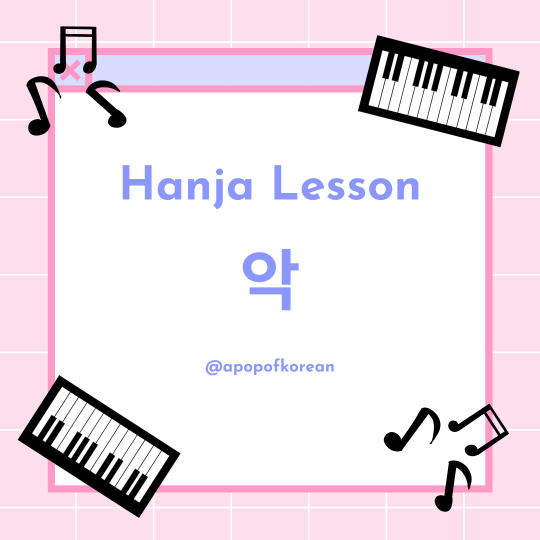
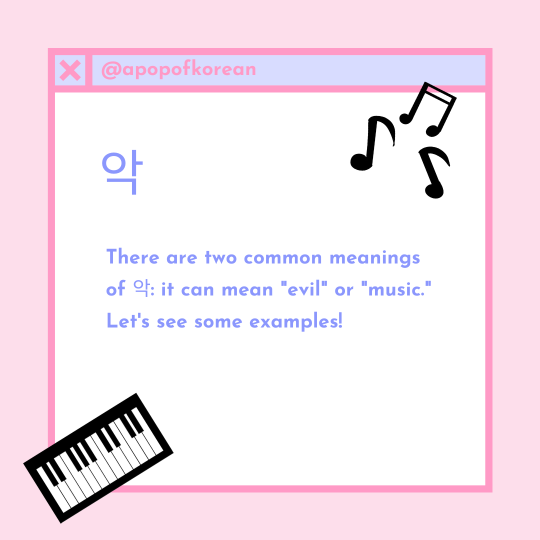
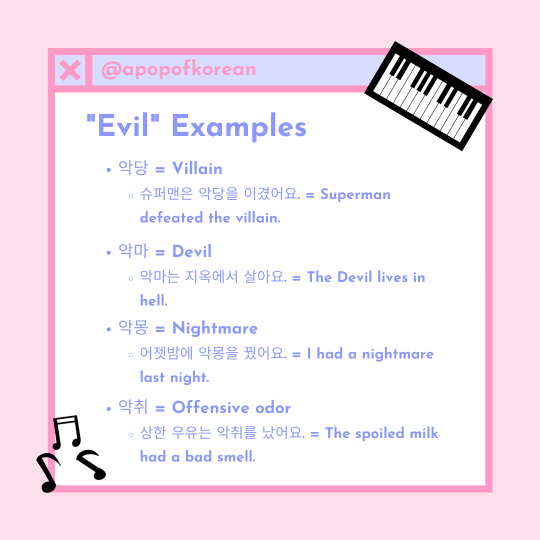
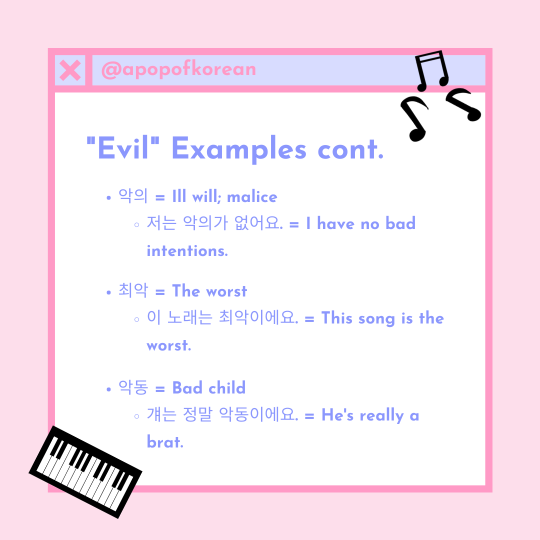


- My masterlist
- Joinmy Discord chat here to practice Korean with others!
- Follow me onInstagram herefor more Korean content!
- GetDrops Premium usingmy affiliate linkto expand your Korean vocab!
- Check out myKo-Fi to support this blog and my studies! Thank you for your generosity!
안녕하세요 여러분! I have another Hanja lesson for y’all – this one is about 수! This lesson doesn’t list every single possible meaning of 수, but these are some common ones. You can find this post on my Instagram as well; be sure to follow me there for more Korean content! I hope this is helpful!

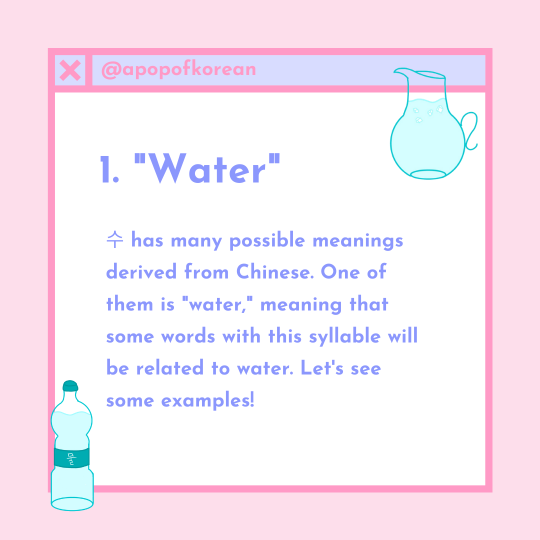
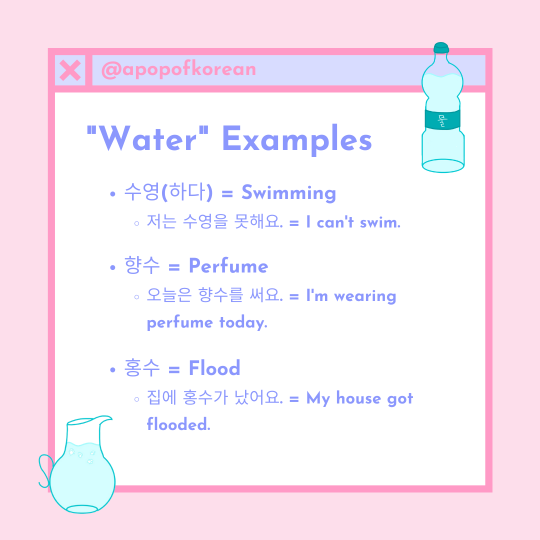

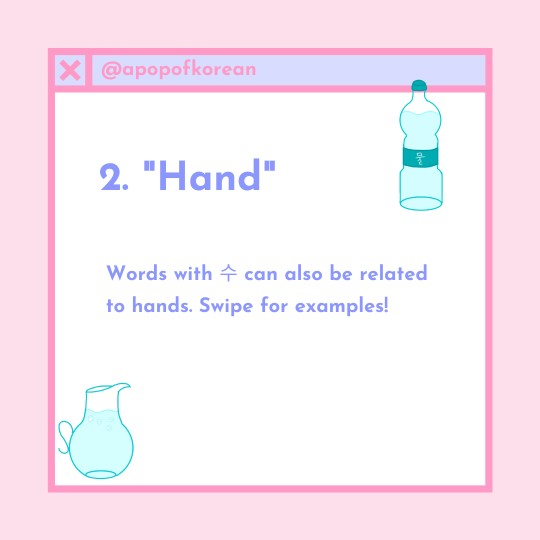
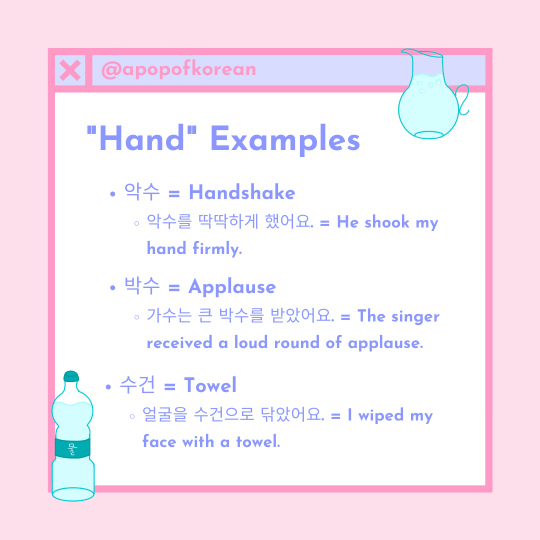
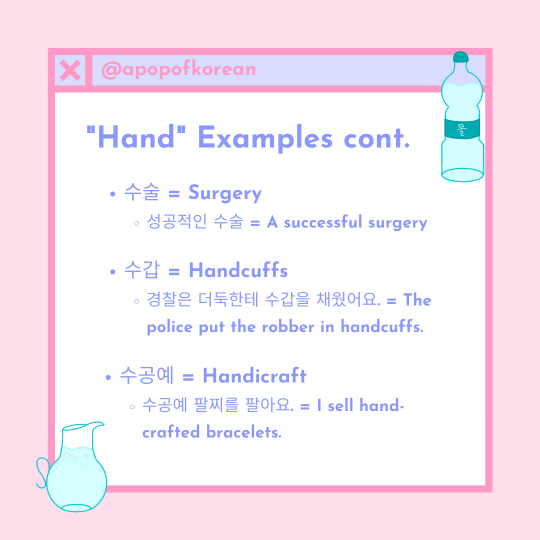

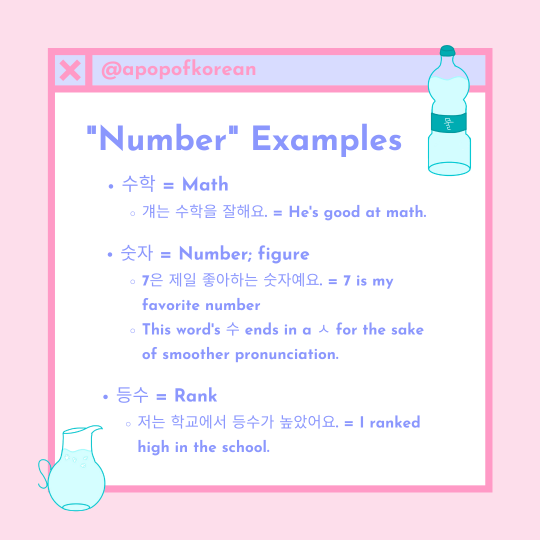
- My masterlist
- Joinmy Discord chat here to practice Korean with others!
- Follow me onInstagram herefor more Korean content!
- GetDrops Premium usingmy affiliate link to expand your Korean vocab!
- Check out myKo-Fito support this blog and my studies! Thank you for your generosity!

I love flowers so much! 꽃
(꽃 is the word for flower)
Today is 한글날!
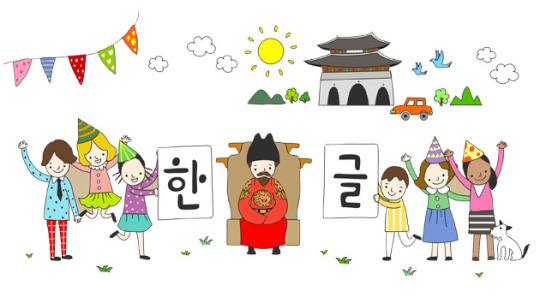
한글날 celebrates the creation of Korea’s unique alphabet by the 15th-century monarch Sejong the Great. Hangul was made with the express purpose of being so easy that one could learn it in a day and now today Korea is one of the most literate nations on earth! Which is confirmed with most people in the community and even outside knowing the very popular ”Learn-to-Read-Korean-in-15-Minutes” comic.
Even though korean has changed since the 1400′s hangul is still one of the easiest writing systems to learn, even with the confusion of the difference between ㅔ and ㅐ. To learn more about 한글 and how its developed I recommend checking out koreanwikiproject.
Heres some quick resources for learning 한글!
learn korean
hi i previously made a post about learning korean the “lazy way” so i was thinking about making one about the “cute way”
what do u think??? do u want me to make the post? pls lemme know!!
learn korean : the lazy way
you may have already been in that situation where you’re trying to communicate with a native korean via texts but somehow aren’t able to distinguish some words because they’re written a certain way. well as well as in english or any other languages korean also has its lazy way of using it. we’ll see some words in their correct form and then in their “lazy/text” form.
이렇게 (like this) : 이러케
그렇게 (like that) : 그러케
어떻게 (how) : 어떠케, 어케
왜 이/그렇게 (why are u so…) : 왤케
그렇구나 (i see) : 그러구나
~고 싶다 (to want) : 고시퍼
귀엽다 (to be cute) : 겹다
- conjugated : 귀여워->기어워/여워,키여워/어워
괜찮아 (its okay) : 괜차나,갠차나
싫어 (to hate) : 시러
맞아 (to be right, correct) : 마자
전화 (phone) : 저나
~잖아:자나
미안해 (to be sorry) : 미아내, 먄
ㄱㄱ (고고) : let’s go
ㄴㄴ (노노) : no
ㄷㅊ (닥쳐) : shut up
ㅇㅋ (오키) : okay
ㅂㅇ (바이) : bye
ㅎㅇ (하이) : hi
ㅇㅈ (인정) : i admit
ㄱㅅ (감사) : thanks
how to : multiple verbs sentences in korean
helloooooo. so in this post i will be explaining you all how to use multiple verbs in the same sentence.
before learning this, make sure you already kinda master how to conjugate verbs in past, present and future tenses and also know how to use basic sentence structure:)
it will look like Verb stem+고+Verb
-고 is added to verbs you want to link together in order to form your sentence
a simple way to say “and” is using the word “그리고” :
“학교에 갔어요. 그리고 친구랑 만났어요.”
i went to school. and i met with friends.
but let’s say you want to say something like :
“i am studying and listening to music”
공부하고 음막을 들어요
- present tense:
먹다 = 먹-다 = 먹+하고 = 먹고 “eat and…”
말하다 = 말하다-다 = 말하+고 = 말하고 “talk and…”
보다 = 보다-다 = 보+고 = 보고 “see and…”
- past tense :
읽다 = 읽었다-다 = 읽었+고 = 읽었고 “read and…”
좋아하다 = 좋아했다-다 = 좋아했+고 = 좋아했고 “liked and…”
배우다 = 배웠다-다 = 배웠+고 = 배웠고 “learned and…”
- future tense :
노래하다 = 노래할 거+고 = 노래할 거고 “i will sing and…”
찍다 = 찍을 거+고 = 찍을 거고 “i will take a picture and…”
보다 = 볼 거+고 = 볼 거고 “i will see and…”
- more examples :
- “i cooked and ate”
요리했고 먹었어요
- “what are you up to?”
뭐하고 지내요?
“i’m doing well and working”
잘 지내고 일해요
- “i went shopping and watched a movie”
쇼핑하러 갔고 영화를 봤어요

How To Learn Korean Online For Free
There are a lot of ways to go about learning how to speak Korean or any language, and some of them can be very expensive. There are $200 language programs on CD Rom or classroom lessons that take up extra time to travel to and from class, on top of the high cost.
But for those of us on a budget with busy schedules, it may not be feasible to put money into expensive programs or tutors. Adding that to the cost of college tuition or homeschooling curriculum can render it unavailable to many…
Read more here.
Post link
How To Learn Korean Online For Free
There are a lot of ways to go about learning how to speak Korean or any language, and some of them can be very expensive. There are $200 language programs on CD Rom or classroom lessons that take up extra time to travel to and from class, on top of the high cost.
But for those of us on a budget with busy schedules, it may not be feasible to put money into expensive programs or tutors. Adding that to the cost of college tuition or homeschooling curriculum can render it unavailable to many…
Read more here.
Post link













